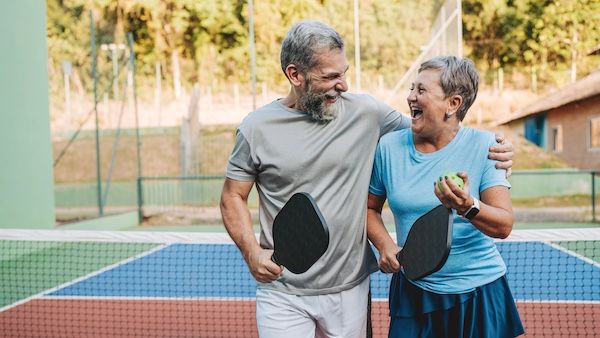Seniors
Want to learn more about this at Kettering Health?
At a Glance
Q: How does exercise help with aging?
A: Regular exercise builds muscle, improves balance, and lowers disease risk, helping you stay strong and independent as you age.
- No medication builds muscle, only exercise.
- Movement lowers risk for heart disease and diabetes.
- Learn tips for starting and staying consistent.
The first signs of aging are often cosmetic: a few gray hairs, some lines on your forehead, and maybe a couple of sunspots. But that’s not all that changes.
“We can visually see the external manifestations of aging,” Dr. Melissa Butler, an internal medicine specialist at Kettering Health Years Ahead, says. “But, internally, we are aging too.”
Getting around may become more difficult as our muscles and bones weaken. Additionally, the risk for certain diseases and cognitive decline increases.
But regular exercise can prevent or slow all of this.
Physical benefits
As we age, we naturally lose muscle mass, which causes us to become weaker. With consistent exercise, though, we can prevent muscle loss and get stronger.
Improving our strength and balance is the best way to prevent falls and injuries as we age, and the only way to do so is by working out.
“There is no medication, no surgery, that builds muscle,” Dr. Butler says. “The only thing that builds muscle is exercise.”
Regular exercise also reduces your risk for disease and chronic health problems like
- High cholesterol
- Diabetes
- Heart disease
- Stroke
“Obviously, genetics do play a role,” Dr. Butler says. “But lifestyle, especially in the United States, is the number one cause of all of those conditions.”
Mental benefits
Because exercise releases endorphins—the happy hormone—an active lifestyle has been shown to help with stress, depression, and anxiety. Regular exercise also helps keep our minds sharp.
“The single best intervention for delaying the onset of and possibly preventing dementia and cognitive decline is regular aerobic exercise.”
Dr. Butler often sees patients worried about their cognitive function as they age, and her number one piece of advice is always regular movement.
Starting and staying consistent
The best time to start working out, Dr. Butler says, is now. No matter your age.
“It’s never too late. We can always see improvement.”
She recommends joining the YMCA or a local senior center and attending senior-focused workout classes. These will help you get moving, stay social, and make new connections.
No matter how you choose to exercise, the most important thing is staying consistent—even when it’s hard.
“People in their 80s and 90s can live very functional lives,” Dr. Butler says. “But it does require work.”









